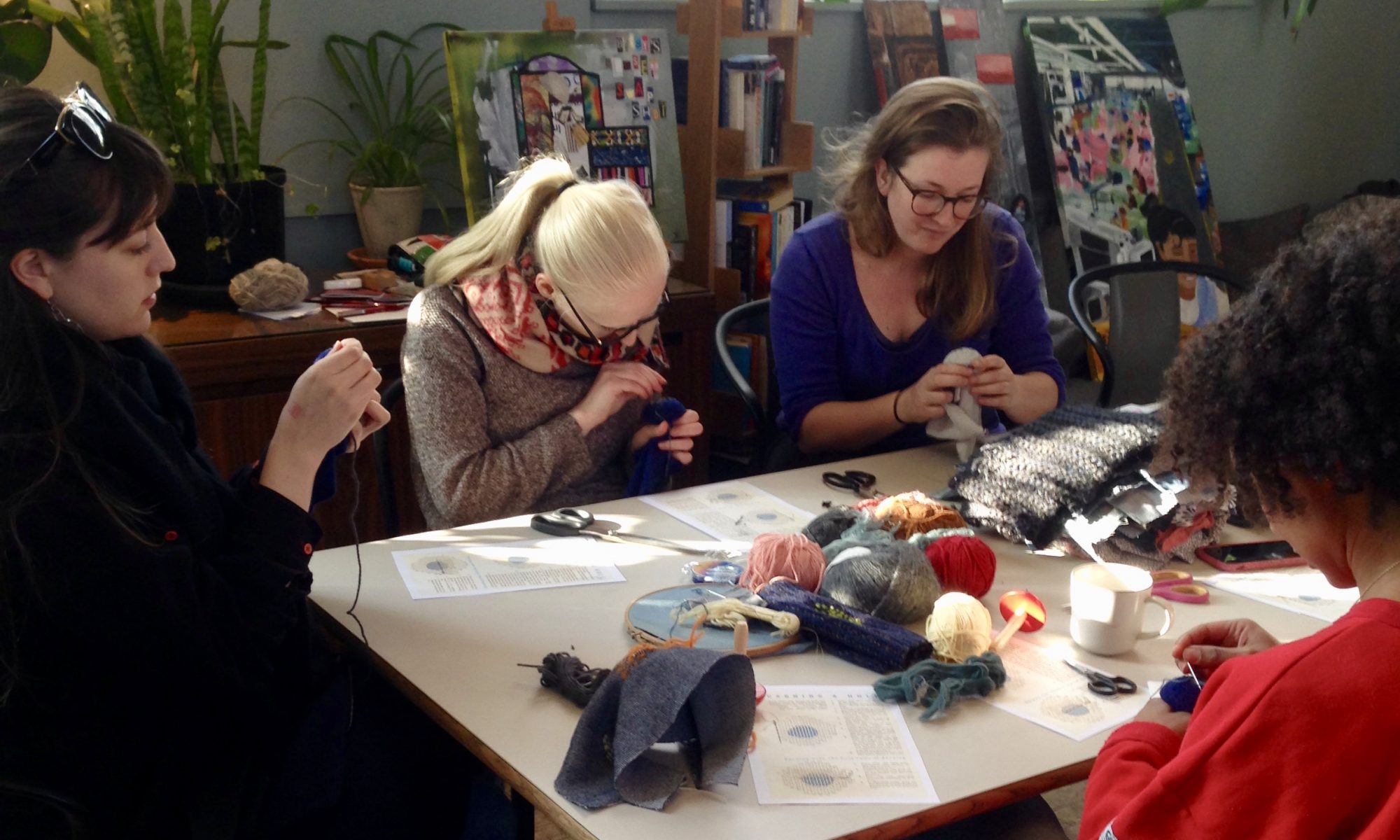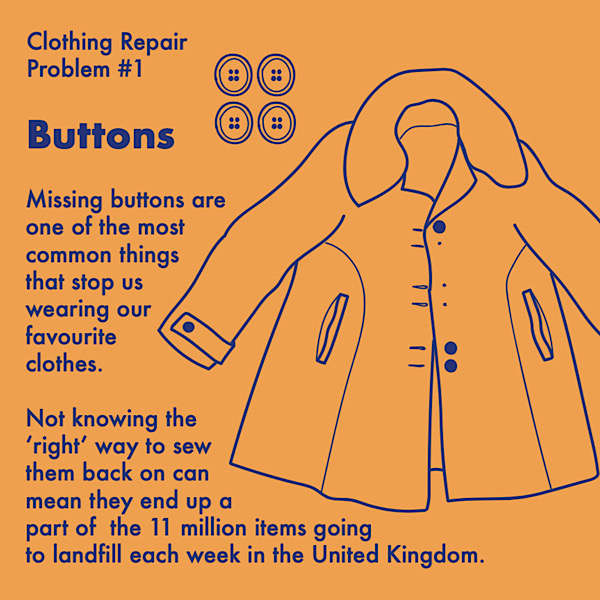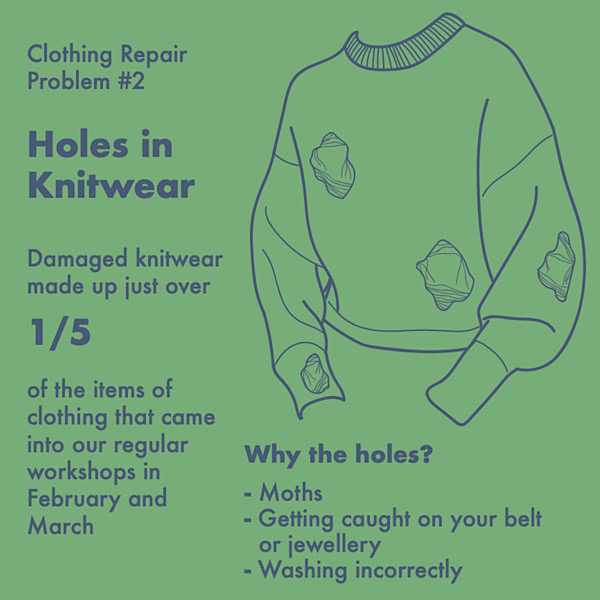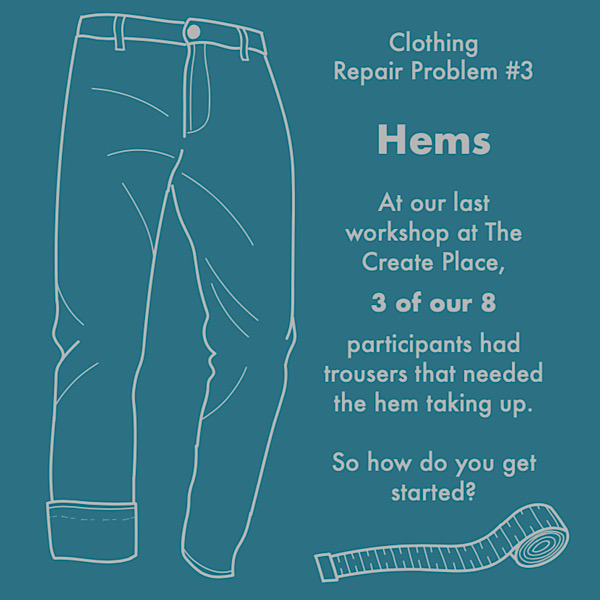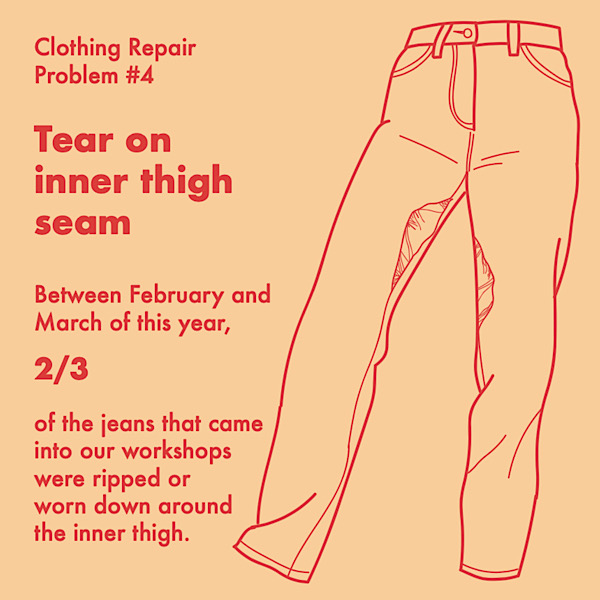We have been taking part in Fashion Revolution Week. Encouraging the repair of clothes through four common problems that we see in our workshops: Sewing on a button, holes in knitwear, repairing a hem and tears on the inner thigh of trousers and jeans.
On Friday, the charity hosted the annual Fashion Question Time, which debates key issues within the fashion industry amongst MPs and industry experts.
Cary Somers, Co-Founder of Fashion Revolution, opens Fashion Question Time:
‘Our challenge this decade is to move beyond our currently destructive and western world view, which is tipping us into a climate catastrophe and a plastic pollution crisis, towards a fashion industry which integrates nature in a truly sustainable way. We need brands and retailers to move from competitiveness to collaboration. We need to move from the commodification of natural resources to working alongside nature with all of her diversity in a way that is respectful, renewable and regenerative. Look at our longer lasting value systems than profit. Prioritising instead the protection of our ecosystems and the well being of our workers and communities. We need to rebuild our connections with how our textiles and our clothing is made in the slow way, in balance with plants, animals, with the earth and with our oceans. Will we all be brave enough to embrace this opportunity and start to create the revolutionary change which the fashion industry so desperately needs to see’.
We have (virtually) attended many events this week to learn more about the change required in the fashion industry and our effects on the environment as consumers. Here are our five learnings from this inspiring week.
1. #whatsinourclothes?
‘Up to 95% of a garment’s impact lies in the material choice alone’ (Amanda Johnston, The Sustainable Angle). ‘Two thirds of our clothes contain 100% of chemicals and yet these are not disclosed to the consumer. We are breathing, eating, drinking the fibres in our clothes, the majority of which are plastic and chemical.’ Peter Gorse of Golf Refugees, who believes fashion brands should use blockchain technology and full disclose all the processes used to make our clothes.
2. Consume Less
‘If we consume less it automatically reduces the number of plastics and chemicals in our clothes.’ Baronness Bennett of Manor Castle, Green Party (eb4Fash Rev). ‘How do our habits have an impact? for example, if consumers knew that ordering multiple sizes online get burnt when they return them, would they stop? How do the facts help the consumers draw the connection and build the gap?’ Kenya Hunt, Grazia Fashion Director (FQT).
3. Repair
Extending the life of the clothes already in our wardrobe through repairing. ‘Appreciating the craft of our clothes means we are less likely to throw it out.’ Dr Lisa Cameron MP (FQT)
4. Become an Activist
Lobby to the Government for transparency on what is in our clothes and regulating the actions of fashion brands. A tax on virgin plastics is due to be introduced in 2022 but this does not include textiles. ‘Less emphasis on the consumer, brands need to be incentivised to do the right thing’ Mary Creagh, former MP. Fashion Revolution have tools on their website to help us lobby our MPs and favourite brands.
5. Make a Start
It is better to do something imperfectly than nothing at all. Kenya Hunt talked of the problems surrounding creating a sustainable issue of a magazine which also receives funding through advertising from unsustainable brands but ‘we have to start somewhere!’. Whilst Dr Lisa Cameron discussed how from a psychologists point of view it is human nature to ‘do a bit of what we think is right and then lapse’. It takes a while to get to the point where this new habit is embedded. It is not always easy for businesses or consumers to change behaviours. This moment of pause in the fashion industry is an ideal time to start.
Orsola de Castro, Co-Founder of Fashion Revolution, summarises the debate: ‘The fundamental role we will all have to play post Covid-19 more than ever to avoid a humanitarian and environmental crisis. Our current situation is highlighting the worse and best in our society at the same time. The worst is that our system values profits over people and mindless growth over sustainable prosperity. This has never been so outrageously visible until now. The cancelled orders, the lost jobs and the total disregard for human suffering and safety. The best is in a few short months we are seeing that nature has responded almost immediately free from our onslaught. Pollution is down, fish are returning to the rivers and canals, the big cities are quiet with no cars or aeroplanes. We can all see the stars at night. We are also seeing an increase in human empathy. For me, most important, we are growing a generation of kids that have been somehow temporarily suspended from hero worshipping privileged celebrities and are getting to know the real heroes, the people. The doctors, the nurses, the carers, the public workers who save our lives and who make our lifestyles possible. We will have to look for balance after all this. let’s ensure this period of restrictions won’t be followed by one of hyper-excesses, of business as usual times ten. There are ways to make an adequate amount of product, providing dignified work for the people who make them while protecing and conserving our environment. We have to invest in them and implement them with rigour. The call for this Fashion Question Time couldn’t be more simple: Mass consumption, the end of an era? Remove the question mark. Mass consumption, the end of an era – full stop.’

Fashion revolution was established in 2013 a year after the Rana Plaza disaster that killed 1138 garment workers in Bangladesh. Since then, the charity have been campaigning globally against the human and environmental consequenses of the fashion indsutry. Encouraging brands to change their practices to a more transparent and circular model and encouraging consumers to ask #whomademyclothes? This year the charity is also encouraging us to ask #whatsinmyclothes?
References: Events we have virtually watched this week
The Sustainable Angle – material solutions from the Future Fabrics Expo
